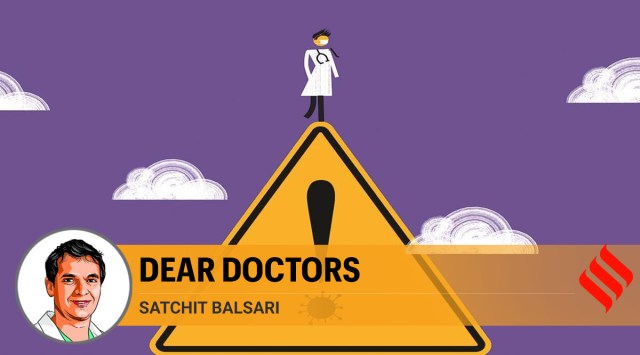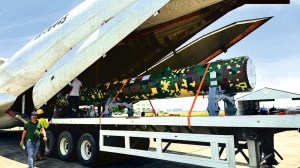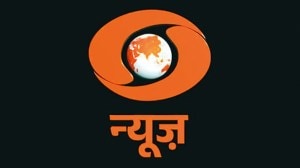- India
- International
Physicians may once again have the ear of their communities. To sustain this regained trust, we need to introspect
It is incumbent upon healthcare providers who have borne witness to the societal fissures that determined who lived and who died, to help rebuild and reimagine. They ought not to retreat to the wings.
 Change in healthcare, in most countries, remains profoundly myopic and confined to digitisation, remuneration and algorithmisation. (Illustration by C R Sasikumar)
Change in healthcare, in most countries, remains profoundly myopic and confined to digitisation, remuneration and algorithmisation. (Illustration by C R Sasikumar)Globally, eight crore people are reported to have been infected and 18 lakh dead, from COVID-19. The true toll is, of course, much higher, as seroprevalence studies — including from India — have indicated. Thousands of others have already died, or will die, from loss of wages, loss of healthcare, or starvation due to the pandemic. In the world’s wealthiest country, there were 15 per cent more deaths in 2020 than in 2019, the highest year-on-year increase in a century. Citizens around the world are still being whiplashed from lockdown to lockdown as schools, factories, and offices open and shut, and wage-jobs have nearly disappeared. And through this all, health systems around the world have resisted near inevitable collapse – out of sheer human grit, and a deep sense of duty. 2020 will be remembered as the year of mayhem, the year when governments let their peoples down. It will also be remembered as the year of science, and of scientists. It is also the year of healthcare providers around the world – women and men who woke up every morning, wondering whether today may be the day when they would “catch it” at work, and bring it home to their families, to their newborns, to their spouses, or to their parents. Will their pledge to save lives, imperil their own, and of those they most loved?
In a Whatsapp survey of my classmates from Grant Medical College and their colleagues, who are now across India, I learnt that nearly 80 per cent continued to see patients in person, and an additional 17 percent saw their patients remotely. Seventy-eight per cent of those that did not have adequate PPE continued to go to work because they felt it was the morally right thing to do. Nearly 41 per cent of all who went to work felt their skill sets were required. I have yet to encounter a single technician, nurse or doctor, anywhere, who did not show up to work when they were needed. That does not mean that every single one of them may not have hesitated as she stepped out of her home or lingered a little longer to hug her child.
The toll on healthcare providers has not been insignificant, thought it perhaps pales in the face of utter economic devastation that millions around the world have suffered. But the daily stress of going to work and wondering whether the very skills one has honed over decades threaten to take you down as well, can be crippling. The little pleasures of clinical medicine are usually either wrapped in diagnostic and therapeutic triumphs – like the uneventful gliding of a breathing tube down a patient’s windpipe, or in simple human gestures, like leaning over and listening to a patient’s whisper while holding their hand. A tight squeeze is sometimes as reassuring to the doctor as it is to the patient. But SARS-Cov-2 succeeded in draining most happiness from routine care. Every patient is a threat, every healthcare provider could be an asymptomatic carrier. The House of God is silent as everyone tiptoes around their perpetual anxiety.
Despite communities around the world acknowledging these healthcare heroes through daily applause and public recognition, frontline clinicians often had no say in critical decisions that directly affected them, their patients and their working environs. This lapse has been particularly stark in India. A letter circulated early in the pandemic by the public health department of Mumbai’s premier medical college demanded that infected trainee-doctors explain how they got infected. A letter in mid-summer by India’s premier research agency declared that India will have a vaccine on August 15. Unproven remedies were reportedly being peddled, as matter of policy, for prevention and cure. Misguided overreach resulted in simultaneously crushing the private healthcare system in urban India and abandoning millions dependent on rural healthcare.
Such actions and inactions by those in charge risked the lives of patients and healthcare providers alike, around the world. In the United States, where I currently practice, the highest branches of government colluded to “let people get infected.” By the end of the year, most clinicians knew a healthcare provider lost to COVID-19. Globally, 7,000 had died by September. What healthcare providers are owed is not the clanging of pots, but accountability, and a seat at the table, as we rebuild our broken world.

Practicing clinicians, epidemiologists and infectious disease doctors were often underrepresented or completely absent in pandemic response planning, including in India. This pervasive lack of representation is not coincidental. In recent years, the commanding trust that physicians once enjoyed in society that allowed them to be powerful voices in daunting battles against landmines and nuclear weapons (where both efforts resulted in Nobels for physicians’ organisations), has been gradually eroded for a variety of reasons. While corporatisation of healthcare is the primary driver in the West, the highhandedness and sometimes outright quackery practiced by many providers in India has resulted in society’s skepticism of the profession. Even during the pandemic, the medical profession was often represented by those without relevant subject matter expertise, or sometimes, outright histories of prior mismanagement.
Fortunately, the design and dispensation of bad advice, bad policy, and bad medicine, even by those in white coats, was trounced by the clinical conduct of thousands at the bedside. For a fleeting moment, physicians might once again have the ear of their communities. To sustain this regained trust, introspection is however warranted. As a profession, our conduct has not been beyond reproach. “Cut-practice,” and India’s contribution to antibiotic resistance, are two enduring and shameful examples.
The misery foisted on society by the pandemic has resulted in urgent calls for change. But change in healthcare, in most countries, remains profoundly myopic and confined to digitisation, remuneration and algorithmisation. This hurried reductionist approach seeking to correct a supply-demand mismatch is unimaginative. As the pandemic has shown — and as have the gains in life expectancy over the past 100 years – the greatest strides will be made not only by treating, but by preventing malady. It is incumbent upon healthcare providers who have borne witness to the societal fissures that determined who lived and who died, to help re-build and re-imagine. They ought not to retreat to the wings.
There are remarkable examples of how Indian clinicians have engineered tectonic shifts in healthcare delivery in India, from making cardiac surgery affordable to the masses, to delivering scientifically sound medical care, door to door, in the remotest communities of Melghat, Gadchiroli, Jhagadia, Sehore or Bilaspur. The stories of Narayan Hrudayalaya, MAHAN, SEARCH, SEWA-Rural, Sangath or JSS have inspired legions of medical students in India and abroad because they capture what resonates at the heart of medicine – the spirit of service. A deep understanding of human ailment, and of the societal ills that cause it, is the foundation of their success.
This article first appeared in the print edition on December 31, 2020, under the title “Dear Doctors”. The writer is emergency physician and assistant professor at Harvard’s medical and public health schools
EXPRESS OPINION
More Explained
Apr 20: Latest News
- 01
- 02
- 03
- 04
- 05









































